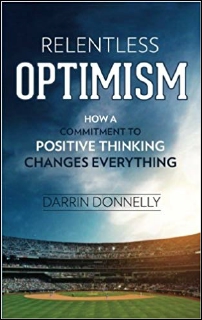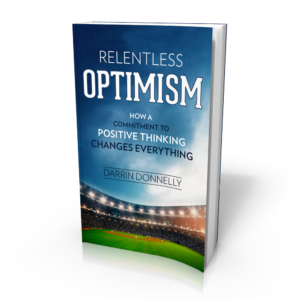 Want to know what your life will look like a year from now? Listen to what you’re saying when you talk to yourself. Your self-talk determines your future.
Want to know what your life will look like a year from now? Listen to what you’re saying when you talk to yourself. Your self-talk determines your future.
The above passage is from my book, Relentless Optimism, and it concisely sums up exactly why the way you talk to yourself is so important.
Self-talk determines your future results and, unfortunately, most of us have an inner voice that is way too negative. We tend to beat ourselves up when something bad happens and it only makes things worse—it only leads to more negative consequences.
But, there is a way to quickly defeat that negative voice and replace it with positive, empowering self-talk, which leads to positive results.
Here’s the simple three-step method as described in Relentless Optimism…
Everyone encounters negative events—a strikeout at the plate, a bad break at work, a lost job, a bad grade, whatever. And most people respond to those negative events with a pessimistic response.
They react by telling themselves that the negative event is permanent. They convince themselves that they missed their chance at success—that this disappointment is the first of many more to come and that new or better opportunities will never come again.
They tell themselves that the negative event is contagious. They think it will lead to negative events in other areas of life. They worry that because one thing went wrong now everything is going to go wrong.
And finally, they make the negative event personal. They beat themselves up and think the negative result is all their fault. They didn’t just experience a failure; they convince themselves that they’ve become failures.
Optimists, on the other hand, remind themselves that every negative event is a lie. That’s L-I-E.
The L stands for Limited. Optimists see the negative event as temporary and limited to a single moment. A strikeout was a failure in that particular at-bat, but it’s over and done with. You have to move on. It has nothing to do with what will happen the next time you’re up to bat—except that it’s a good learning opportunity for having a better outing next time.
The I is for Isolated. Optimists see the negative event as specific to that one particular area. It isn’t contagious and it won’t spread to anything else…if you don’t let it. A failure at the plate should have nothing to do with how you play defensively the rest of the game. Along those same lines, there’s no reason to let a negative event at work affect your health or your family life. Yet, most people do. It’s all in their mind.
The E is for External. Optimists remind themselves that people and things outside of their control contributed to the negative event. Failure is external, not internal. Don’t let a single negative event become personal and affect your self-worth. A slump on the baseball field does not mean you’re a failure; it means you’ve encountered a negative event and now you have the chance to respond positively to it.
Remember that. Failure is a lie; that’s L-I-E. Failure is Limited, Isolated, and External. It’s Limited to one particular moment, it’s Isolated to one particular area, and it occurred Externally—outside of you.
— From the book Relentless Optimism: How a Commitment to Positive Thinking Changes Everything
The next time you encounter a negative event and you hear that voice in your head telling you that it’s a permanent problem, that it’s a contagious problem, and that it’s a problem that affects your self-worth; quickly counter that self-talk with the L-I-E method.
Remind yourself that the negative self-talk you’re hearing is a LIE. The negative event you just encountered is:
L – Limited
I – Isolated
E – External
Repeat this reminder whenever you encounter adversity.
When you counter the negative LIE that you’re hearing in your head, you’ll quickly bounce back from adversity and be on your way to positive results.







